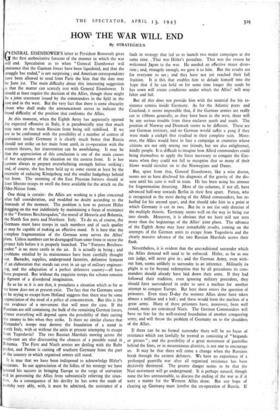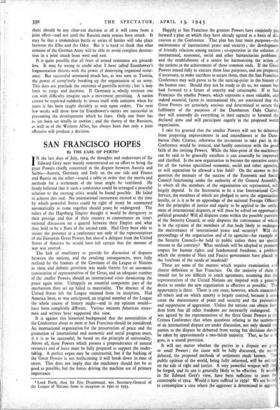HOW THE WAR WILL END
By STRATEGICUS
GENERAL EISENHOWER'S letter to President Roosevelt gives the first authoritative forecast of the manner in which the war will end. Speculation as to when " Genetal Eisenhower will announce that the German forces have been liquidated, and that the struggle has ended," is not surprising ; and American correspondents •
have been allowed to send from Paris the hint that the date may be June rst. The main difficulty about this interesting suggestion is that the matter can scarcely rest with General Eisenhower. It should at least require the decision of the Allies, though there might be a joint statement issued by the commanders in the field in the east and in the west. But the very fact that there is some obscurity about who shall make the announcement serves to indicate the broad difficulty of the position that confronts the Allies.
At this moment, when the Eighth Army has apparently opened the expected offensive in Italy, it is paradoxically true that much may turn on the main Russian front being still stabilised. If we are to be confronted with the possibility of a number of centres of resistance inside Germany it is clearly much better that Russia should not strike on her main front until, in co-operation with the western thrusts, her intervention can be annihilating. It may be that the appreciation of this conclusion is one of the main causes of her acceptance of the situation on the eastern front. It is her custom always to prepare overwhelming strength before striking ; and, of course, she has been held up to some extent at least by the necessity of reducing Konigsberg and the smaller hedgehogs behind her front. The storming of the East Prussian fortress should at least liberate troops to swell the force available for the attack on the Oder-Neisse front.
One thing is certain : the Allies are working to a plan concerted after full consideration, and modified no doubt according to the demands of the moment. The problem is how to prevent Hitler dragging on the war indefinitely by maintaining a focus of resistance in the " Fortress Berchtesgaden," the massif of Moravia and Bohemia, the North Sea ports and Northern Italy. To do so, of course, the
Germans must have troops in such numbers and of such quality as may be capable of making an effective stand. It is here that the
complete fragmentation of ' the German army serves the Allies' plans. Unless numbers can be disengaged from some front or sector the project fails before it is properly launched. The " Fortress Berchtes- gaden " is no mere castle in the air. It is actually in being ; and problems entailed by its maintenance have been carefully thought out. Barracks, supplies, underground factories, defensive features
of an elaboration that stands out even in an age of military engineer- ing, and the adaptation of a perfect defensive country—all have been prepared. But without the requisite troops the scheme remains a figment of a disordered imagination.
In so far as it is not that, it postulates a situation which as far as we know does not at present exist. The fact that the Germans seem to be trying to escape from Holland suggests that there may be some appreciation of the need of a policy of concentration. But this is the one 'evidence of a movement that will meet the case. If the Russians are still containing the bulk of the remaining German forces, almost everything will depend upon the possibility of their cutting the enemy to bits when they strike. Is there no similar chance that Alexander's troops may destroy the foundation of a stand in north Italy, with or without the units at present attemping to escape from Yugoslavia? The two Russian Marshals moving across the south-east are also discounting the chances of a possible stand in . Bohemia. The First and Ninth armies are dealing with the Ruhr Pocket, and Patton is cutting off southern Germany from the part of the country in which organised armies still stand.
It is true that we have been indisposed to acknowledge Hitler's successes. In our appreciation of the follies of his strategy we have ignored his success in bringing Europe to the verge of starvation and in . preventing the Allies from substantially relieving the situa- tion. As a consequence of his devilry he has sown the seeds of anarchy ..very ably, with, it must be admitted, the assistance of a fault in strategy that led us to launch two major campaigns at the same time. _Thar was Hitler's postulate. That was the reason he welcomed Japan to the war. He needed an effective major diver- sion ; and, strangely enough, we gave it to him. But the results are for everyone to see ; and they have not yet reached their full fruition. It is this that enables him to delude himself into the hope that if he can hold on for some time longer the seeds he has sown will create conditions under which the Allies' will may falter and fail But all this does not provide him with the material for his re- sistance centres inside Germany. As for the Atlantic ports and Courland, it seems impossible that, if the German armies are really cut to ribbons generally, as they have been in the west, there will be any serious trouble from these enclaves north and south. The position of Norway and Denmark seems to be different. These arc not German territory, and no German would suffer a pang if they were made a cockpit that resulted in their complete ruin. More- over, the Allies would have to face a campaign in countries whose citizens are not only among our friends, but are also enlightened, kindly people. It is difficult to imagine how Allied commanders could bring themselves to apply the force necessary to conquer the Ger- mans when they could not fail to recognise that so many of their blows would ricochet on to the Norwegians and Danes.
But, apart from that, General Eisenhower, like a wise doctor, seems not to have disclosed his diagnosis of the gravity of the dis- ease until his cure is well in train. He has been using his armour for fragmentation thrusting. Most of the columns, if not all, have advanced half-way towards Berlin in their first spurt. Patton, who is recognised as the most daring of the Allied commanders, has re-. fuelled for his second spurt, and that should take him to a point at which Germany is cut in two. But he is not the only director of the multiple thrusts. Germany seems well on the way to being cut into shreds. Moreover, it is obvious that we have still not seen more than the beginnings of the Allies' joint plans. The advance of the Eighth Army may have remarkable results, coming on the attempts of the German units to escape from Yugoslavia and the clearly massive advance of the two Russian Marshals across their flank.
Nevertheless, it is evident that the unconditional surrender which the Allies demand will need to be enforced. Hitler, as far as one can judge, will never give in ; and the German Army, even with- out him, seems unlikely to surrender to an inference. Militarily its plight is so far beyond redemption that by all precedents its com- manders should already have laid down their arms. If they had followed their tradition, even ignoring military precedent, they should have surrendered in order to save a nucleus for another attempt to conquer Europe. But here there enters the question of prisoners. Even since D-day the western Allies alone have taken almost a million and a half ; and these would form the nucleus of a great army. Many of these prisoners have, moreover, been well rested, many are convinced Nazis. The German Commanders will have no fear for the well-trained foundation of another conquering army, and will throw the problem of Germany on to the shoulders of the Allies.
If there can be no formal surrender there will be no focus of resistance which can lawfully be treated as consisting of " brigands or pirates " ; and the possibility of a great movement of guerrillas behind the lines, or in mountainous districts, is not one to encourage us. It may be that there will come a change when the Russians break through the eastern defences. We have no experience of a prolonged guerrilla war after all organised resistance has been decisively destroyed. The greater danger seems to be that the Nazi movement will go underground. It is perhaps natural, though none the less unreasonable, to discuss the ending of the war as if it were a matter for the Western Allies alone. But any hope of clearing up Germany must involve the co-operation of Russia. If
there should be any clear-cut decision at all it will come from a joint effort—and not until the Russian main armies have struck. It may be that a tremendous battle or series of battles will take place between the Elbe and the Oder. But it is hard to think that what remains of the German Army will be able to avoid complete destruc- tion in a joint attack from west and east.
It is quite possible that all fears of armed resistance are ground- less. It may be wrong to credit what I have called Eisenhower's fragmentation thrusts with the power of destroying organised resist- ance. But successful armoured attack has, as was seen in Tunisia, the power of comp'etely breaking up the organisation of an army. This does not preclude the existence of guerrilla activity ; but it may limit its range and duration. If Germany is wholly overrun one can with difficulty imagine such a movement persisting. A nation cannot be expected suddenly to invest itself with initiative when for years it has been taught slavishly to wait upon orders. The next few weeks will show how far Eisenhower's tactics are successful in preventing the developments which he fears. Only one front has as yet been set wholly in motion ; and the theory of the Russians, as well as of the Western Allies, has always been that only a joint offensive will produce a decision.



























 Previous page
Previous page